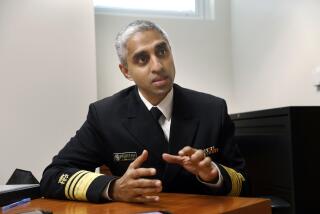‘Guns kill people,’ and leading doctors want to treat them like any other threat to public health

In 2015, more people died from firearms in the U.S. than from motor vehicle crashes. (Oct 10, 2017)
- Share via
The doctors who lead the medical profession’s debates on how best to preserve and restore our health are done with moments of silence in the face of gun-related violence.
In the wake of a mass shooting that killed 59 people and wounded hundreds more in Las Vegas, they neither minced words nor observed political niceties in describing the threat that firearms pose to Americans’ health.
“Guns kill people,” Dr. Howard Bauchner, editor in chief of the influential Journal of the American Medical Assn., and a team of colleagues wrote in an editorial published online Monday. “Guns do not make individuals, their families, or homes safer and they result in far more deaths to loved ones than to an intruder intending to cause harm.”
Such claims are certain to inspire howls of protest from gun-rights advocates. However, in keeping with the tradition of JAMA and other research journals, Bauchner and his co-authors preempted such claims not with heated rhetoric but with with footnotes to studies that support their argument.
One of the earliest studies they cited showed that, in Washington’s King County, 54% of all 743 firearms-related deaths that occurred between 1978 and 1983 took place in the home where the gun had been kept. Only two of these 398 deaths — not even 1% — were cases of an intruder shot during an attempted entry, and seven other people were killed in self-defense.
What’s more, among the fatalities that involved a firearm kept in the home, accidental deaths were 30% more common than self-protection homicides. Suicides involving firearms were 37 times more common than self-protection homicides. The findings were reported in the New England Journal of Medicine.
A more recent study published this year in JAMA Internal Medicine found that Florida’s adoption of a “stand your ground” law, which broadened homeowners’ right to use lethal force in self-defense, was linked to an “abrupt and sustained increase” in homicides by firearm.
In the Annals of Internal Medicine — a journal almost universally read by the nation’s 200,000 primary-care doctors — editor in chief Dr. Christine Laine and deputy executive editor Dr. Darren B. Taichman had similarly run out of patience after the deadliest mass shooting in modern American history.
“More silence is not the answer,” wrote Laine, Taichman and Bauchner along with the top editors of the prestigious New England Journal of Medicine (Dr. Jeffrey M. Drazen) and the open-access journal PLOS Medicine (Dr. Larry Peiperl). With firearms claiming an average of 93 lives per day in the United States — more than half by suicide — guns are responsible for more deaths than vehicle crashes or terrorism.
Many Americans have become accustomed to the threats posed by guns. But an event like Las Vegas should not lose the power to shock, the five journal editors wrote.
“What would happen if on one day more than 50 people died and over 10 times that many were harmed by an infectious disease in the United States?” they asked. “Healthcare professionals would sound the alarm. We would demand funding. We would go to conferences to learn what is known and what we should do. We would form committees at our institutions to plan local responses to protect our communities.”
The same thing should happen when the threat comes not from a virus or bacterium but from a man-made weapon, they wrote.
A handful of physicians working on the front lines of healthcare already have risked the ire of politicians to speak up about gun violence, the group wrote. “We should be proud of them, but they need all of our help. And so do our patients.”
The journal editors called on their fellow doctors to ask their patients about their ownership of guns, to challenge their belief that those guns increase their safety, and to direct them toward risk-reducing resources “just as you already do for other health risks.”
Physicians should also demand funding for studies and mobilize their employers — hospitals, healthcare groups and universities — to plan campaigns aimed at reducing firearms violence.
“We don’t throw up our hands in defeat because a disease seems to be incurable,” the journal editors wrote. “We work to incrementally and continuously reduce its burden. That’s our job.”
MORE IN SCIENCE
As much as 2.6% of your DNA is from Neanderthals. This is what it’s doing
U.S. researcher among 3 awarded Nobel Prize in chemistry for developments in electron microscopy
3 Americans win Nobel Prize in medicine for uncovering the science behind our biological clocks







